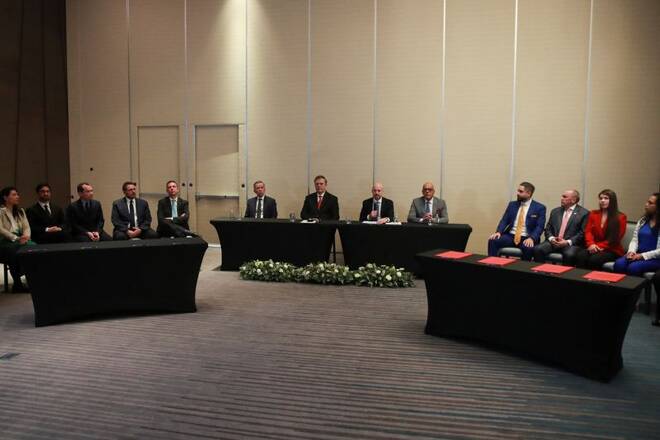Advertisement
Advertisement
Venezuela’s frozen funds to be gradually released for humanitarian aid
By:
MEXICO CITY (Reuters) - Venezuela's government and opposition have asked the United Nations to manage several billions of dollars held in foreign banks, which will be gradually unfrozen to combat a humanitarian crisis in the South American country, delegates announced in Mexico City on Saturday.
By Diego Oré
MEXICO CITY (Reuters) -Venezuela’s government and opposition have asked the United Nations to manage a fund for billions of dollars now held in foreign banks, which will be gradually unfrozen to combat a humanitarian crisis in the oil-rich nation, delegates announced in Mexico City on Saturday.
Sources told Reuters last month the frozen funds amount to more than $3 billion.
The money, held in Venezuelan-owned accounts overseas, was frozen by U.S. and European banks after the United States ramped up sanctions under the administration of President Donald Trump, designed to pressure President Nicolas Maduro to take steps toward free elections.
Talks between Maduro’s government and its political opponents resumed in Mexico City on Saturday, mediated by Norway, after being on ice for more than a year.
U.S. Secretary of State Antony Blinken welcomed the talks as “an important step toward restoring democracy to Venezuelans.
“We will look to the parties to achieve lasting agreements that set the course for free and fair presidential elections in 2024,” he said on Twitter.
Maduro also posted a statement on Twitter, saying: “We will always strive for dialogue with all Venezuelan society. We continue to take important steps for the well-being of our country.”
Following the announcement for a U.N.-administered fund, the U.S. Treasury Department issued a license for Chevron, the second largest U.S. oil company, to expand operations in Venezuela, allowing it to import Venezuelan crude into the United States.
The government’s delegation was led by congressional leader Jorge Rodriguez of Venezuela’s ruling United Socialist Party (PSUV), and the opposition group was headed by politician Gerardo Blyde.
Maduro had said the aim of the talks was to recover the “kidnapped” resources for public investment: “Then we will see what other issues can be discussed.”
The funds are set to help stabilize the country’s electric grid, improve education infrastructure and deal with the impact of this year’s deadly rains and flooding.
It is part of a broad agenda that covers U.S. sanctions on Venezuela, conditions for the next presidential elections and the status of hundreds of political prisoners – though these issues will not be discussed in this round of talks.
“This agreement provides the template for how further progress can be secured,” the European Union said in a statement.
More than 7.1 million Venezuelans have left their country according to U.N. estimates this year, many migrating to other Latin American countries or the United States, as Venezuela battles high inflation, and food and medicine shortages. More than half of Venezuelan migrants do not have access to three meals a day, U.N. estimates showed.
In Venezuela, a survey by local universities this year showed some 78% of the population was worried about lack of food, compared with 88% in 2021.
Some Venezuelan and U.S. critics raised concerns the liquidity injection could boost Maduro’s credentials before the country’s 2024 elections.
(Reporting by Diego Ore Oviedo, Vivian Sequera and Sarah Morland; editing by Diane Craft and Leslie Adler)
About the Author
Reuterscontributor
Reuters, the news and media division of Thomson Reuters, is the world’s largest international multimedia news provider reaching more than one billion people every day. Reuters provides trusted business, financial, national, and international news to professionals via Thomson Reuters desktops, the world's media organizations, and directly to consumers at Reuters.com and via Reuters TV. Learn more about Thomson Reuters products:
Did you find this article useful?
Latest news and analysis
Advertisement
